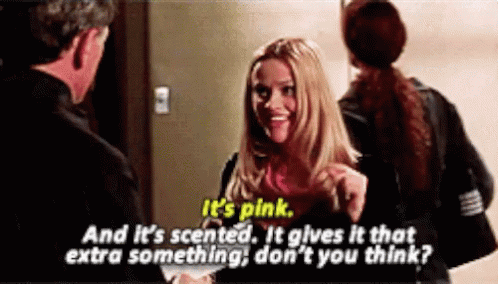While Elle Woods is a fictional character that is far from being the pillar of feminism, the 2001 cult classic Legally Blonde, showcases the common societal standards and tropes placed upon women in society. Elle uses her appearance as a way to express her bubbly and energetic personality and doesn’t cowl to peoples negative opinions of her. Throughout the constant battle regarding her femininity and intelligence, she remains steadfast on proving that you can love the color pink and still be an amazing lawyer.
Throughout the movie, Elle’s image appears to be a point of contention. The film opens with the camera panning on Elle as she brushes her long, blonde hair, shaves her legs, paints her nails and slips into a pair of light pink heels. Her actions signify that she cares about the way she looks and puts daily effort into looking her best. Her passion for her image can also be seen in the way she dresses, choosing for pink colored clothing that some would consider to be overtly revealing. While her sense of fashion is a liberating example of self expression, others underestimate her based on her appearance.

Her boyfriend Warner, on the other hand, is tall, handsome and the traditional image of what a “successful” masculine man should look like. He has numerous friends who flock to him to feel seen by him and Elle is constantly fighting off other girls who want to be with him. In society, Warner seems to be the perfect man, yet he hides behind his overly masculine persona in an effort to distract from the fact that in reality, he is overtly shallow and insecure. Warner has never had to work hard for anything in his life, relying on his parents as his source of income through college and eventually law school. Because of this, his better-than-you personality gives him a sense of entitlement over others. Eventually, he breaks up with Elle under the pretense that he needs “a Jackie not a Marilyn,” albeit a dig at her overt expressions of femininity. Warner’s illogical reasoning for the breakup reinforces the outdated ideology that if your overly feminine in society’s eyes you can’t be taken seriously, yet a man who judges woman based on their appearance is seen as the gold star of masculinity. As Elle goes on to prove in the film, having an interest in seemingly frivolous feminine activities and being an intelligent career woman, are not mutually exclusive.
As the movie progresses, Elle eventually gets accepted into the prestigious Harvard Law School. While there, the divide between femininity and masculinity continue to clash. Many of the other men on campus view as a sex object and question why she is there in the first place. I find the chances of anyone questioning a mans intentions to pursue a law degree slim to none. When she is given the chance to work on a murder case going to trial, her law professor challenges her ability to handle the workload after reviewing her pastel pink resume complete with scented paper and pink writing. The disdain that is shown towards Elle throughout the film for her overt femininity can be seen in the workplace today. Numerous companies fire their female employees for “violating” conduct codes put in place to stifle a woman’s creativity and self expression, whereas their male counterparts are praised for their misgivings.

Elle’s drive and determination throughout the film elevate her from the chains that beholden her to assumption by her male peers that she is a ditzy blonde with a chihuahua skating by on her looks. The constant criticism of her intelligence based on her appearance undoubtedly makes her work harder to prove to those naysayers that she is smart and capable of having a successful law career. It begs the question if a man would face the same severe scrutiny based on their appearance, gender or style of dress. Eventually Elle rises to the top of her class and begins to receive post-graduation offers, disproving that she’s not just another “dumb blonde.”
To conclude, in many ways, the film also showed the divide that lies between femininity and masculinity, the latter being universally accepted as a sign of strength, while overly “girly” girls are seen as weak and less than their male counterparts. Through hyper-feminine Elle Woods, Legally Blonde broke the seal confining women to long held societal standards surrounding what it means to be a professional and intelligent woman.
Questions
Are men judged as harshly over their appearance as Elle was?
Is there a divide in how masculine men and feminine woman are treated in society?
Why is femininity typically seen as a bad thing?
This movie is a perfect basic break down of the judgements brought on by femininity whether it be regarding appearance or intelligence levels. What’s really interesting about femininity is how the perception of the concept is changed as you apply it across different genders. A feminine man gets hate and it automatically labeled as gay where as with women it is just the norm. It’s very interesting how as a woman you are shamed for being anything else other than the typical feminine image yet when you do present feminine you are then undermined as less than men. The concept of femininity is almost as problematic as toxic masculinity in the sense that no matter what women do they are locked into a box of what society expects and still being judged for however they may follow along with it.
LikeLike
I have always loved Legally Blonde growing up, but even at a young age, I could point out some of the topics you talked about. Especially during the 1990s (which of course when the movie was created), women were still looked down upon as not being as smart as a man is. Up until the very end of the movie, no man working with her believed that she was going to be able to keep up with them, no matter how much she tried. The wardrobe difference between the men and Elle was also interesting. I feel like people believe that women who are into their clothes and hair only focus on those things and nothing else. When men are dressed nice and well-groomed, people automatically think that they are well off or more sophisticated. Those assumptions people have when the appearance of men make people see them as smart without knowing any of their background, whereas in Elle’s case, everyone thought she was shallow because of the way she dressed. Women in society are always thought of being weaker in every aspect of their lives, whereas masculine men are supposed to be the ones running everything. Even if a woman is feminine, doesn’t mean that she is any less strong, smart, or ambitious and a man and I think this movie really shows that view.
LikeLike
Legally blonde is a perfect representation for women who really try to be equally invested in themselves as they are with their studies and career. I’ve always loved how Elle proves everyone wrong even her parents who you’d think would believe in her. I might be repeating myself but, it’s 2020 and we’re still facing this issue of gender inequality. Women are never taken as seriously as men are, and it’s unfair! I would say yes, femininity is seen as a bad thing because of how a “girly girl” is treated in society; especially in the work environment. It’s sad because men would never be judged as hard as a women would, and this is a prime example of why women may lack confidence in their careers because of what’s drilled into our heads at such a young age. It’s great to see so many feminism movements to really put emphasis on how much work and how strong women really are and honestly men don’t stand a chance!
LikeLike
This movie broke so many barriers for women. It is hard for many women to feel that they can be themselves while also be seen as professional, intelligent, and composed. Elle showed that beauty and brains can exist together. As a society, we are still working on this. Men still have it easier in the workplace. There are far fewer criticisms on what they are wearing or how they decide to go about something. Women are still trying to find where they fit in, and we have come a long way since we started.
LikeLike
For quite a long time, women were conditioned to believe that you need to be helpless or “saved” in some way in order to get a man (obviously, the goal of every female is to get a man, get married, have kids and take care of the home). And the way to appear like you need assistance was to be dainty and fragile, which is based on appearance. Painted nails, hair done, skirts and dresses, high heels – dressing to get a man was a standard. Femininity is typically seen as a bad thing because it implies that a person is weak and helpless.
Things have since changed and women are no longer conditioned to think like that. Some women see femininity as a return to that mentality. However, there are so many strong women, like Elle Woods, who dress in a more feminine manner and are total badasses at the same time. Beauty and intelligence don’t have to be connected, but when they are, it’s often an unstoppable combination. Just because a person has a sense of fashion or cares about her appearance, it doesn’t make them any less intelligent or any less worthy of being taken seriously.
LikeLike